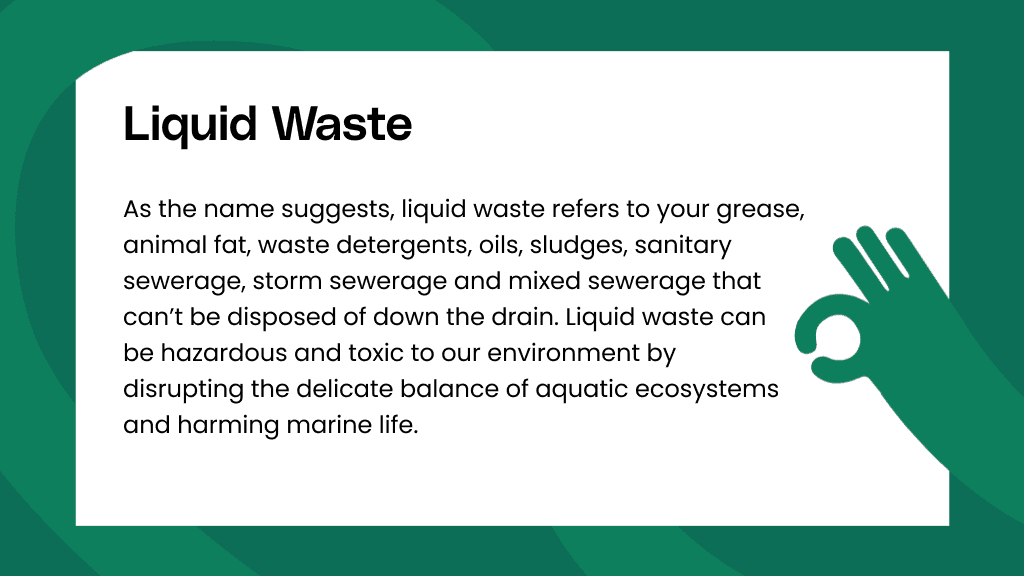8 Easy Facts About Reclaim Waste Explained
8 Easy Facts About Reclaim Waste Explained
Blog Article
The Best Guide To Reclaim Waste
Table of ContentsGetting My Reclaim Waste To WorkReclaim Waste Things To Know Before You Get ThisAbout Reclaim WasteThe 4-Minute Rule for Reclaim WasteThe Of Reclaim Waste
Residential sewer waste refers to the waste and items from a property septic tank. The proper monitoring and disposal of domestic sewer waste need liquid waste to be moved to a sewer therapy plant where the appropriate approaches and equipment are used to purify and dispose of waste.
Industrial waste frequently consists of possible hazards, such as flammable products or a mixture of liquid and strong waste items, and calls for a more sophisticated and detailed disposal process. The disposal of industrial waste typically includes the purification of waste before transportation to make sure safe and appropriate disposal. Hazardous waste is created from by-products and drainage of commercial procedures and manufacturing.
This type of waste can not make use of the very same sewer management transportation or processes as septic or business fluids. The commercial waste monitoring procedure requires the assessment and testing of liquid waste before it goes through the disposal process (liquid waste removal melbourne). Overflow waste is the liquid waste that comes from overflow and excess stormwater in extremely inhabited areas or cities
Overflow waste can trigger contamination and flooding otherwise taken care of properly. Learn more regarding drain cleansing and waste management. Ensuring proper waste management can prevent disasters and reduce ecological injury. Both people in residential setups and specialists in business or manufacturing markets can gain from comprehending the processes and regulations of liquid waste monitoring.
The 8-Minute Rule for Reclaim Waste
Contact PROS Providers today to find out about our waste management and disposal solutions and the proper means to care for the liquid waste you generate.
(https://www.edocr.com/v/pd6avrzq/leonaube33101/reclaim-waste)This so-called 'wastewater' is not just an essential resource however, after therapy, will be released to our land, rivers or the ocean. Used water from bathrooms, showers, baths, kitchen sinks, washings and commercial processes is known as wastewater.

water utilized to cool down machinery or clean plant and equipment). Stormwater, a form of wastewater, is overflow that moves from agricultural and city areas such as roofs, parks, gardens, roadways, courses and rain gutters right into stormwater drains pipes, after rainfall. Stormwater streams neglected straight to local creeks or rivers, at some point reaching the sea.
The Ultimate Guide To Reclaim Waste
In Queensland, most wastewater is treated at sewage treatment plants. Wastewater is carried from domestic or industrial sites via a system of drains and pump stations, recognized as sewerage reticulation, to a sewer therapy plant. City governments build, keep and run most sewer treatment plants. Operators are certified under the Environmental Management Act 1994 to release cured wastewater at an appropriate ecological requirement into waterways.
The Division of Natural Resources suggests city governments about managing, operating and preserving sewage systems and treatment plants. In unsewered locations, city governments might need homeowners to install specific or house sewer treatment systems to treat residential wastewater from bathrooms, kitchen areas, shower rooms and laundries. The Division of Natural Resources authorises using house systems when they are verified to be efficient.
Most stormwater obtains no treatment. In some new subdivisions, therapy of some stormwater to eliminate litter, sand and crushed rock has started utilizing gross pollutant catches. Wastewater treatment takes place in four phases: Eliminates strong matter. Bigger solids, such as plastics and other objects mistakenly discharged to sewage systems, are eliminated when wastewater is travelled through displays.
Wastewater after that streams into big tanks where solids work out and are removed as sludge. Oil and residue are skimmed from the surface area. Uses little living microorganisms referred to as micro-organisms to Homepage damage down and eliminate staying dissolved wastes and fine bits. Micro-organisms and wastes are integrated in the sludge. Removes nitrogen and phosphorus nutrients that could create algal blooms in our waterways and intimidate marine life.
The Definitive Guide to Reclaim Waste
Nutrient removal is not readily available whatsoever sewer treatment plants because it needs pricey specialist equipment. It is ending up being a lot more usual in Queensland. Clear fluid effluent created after therapy might still have disease-causing micro-organisms. If this effluent is launched right into rivers such as rivers or the sea, the micro-organisms will at some point pass away out.

This normally implies wastewater has to be treated or impurities gotten rid of prior to it can be discharged to rivers. A lot of wastewater streams right into the sewage system. Under the Act, regional governments carry out approvals and permits for ecologically relevant tasks (Ages) entailing wastewater launches that might have a neighborhood effect. The division provides authorizations and permits to ERAs entailing wastewater releases that might have a local or statewide effect.
Reclaim Waste Fundamentals Explained
Or else, examples are considered lab evaluation. Frequently several tests are needed to establish the degrees of each of the different toxins such as oils, heavy metals and chemicals in water. Surveillance supplies valid information regarding water top quality and can validate that licence problems are being met. The details gotten through monitoring gives the basis for making water quality decisions.
Report this page